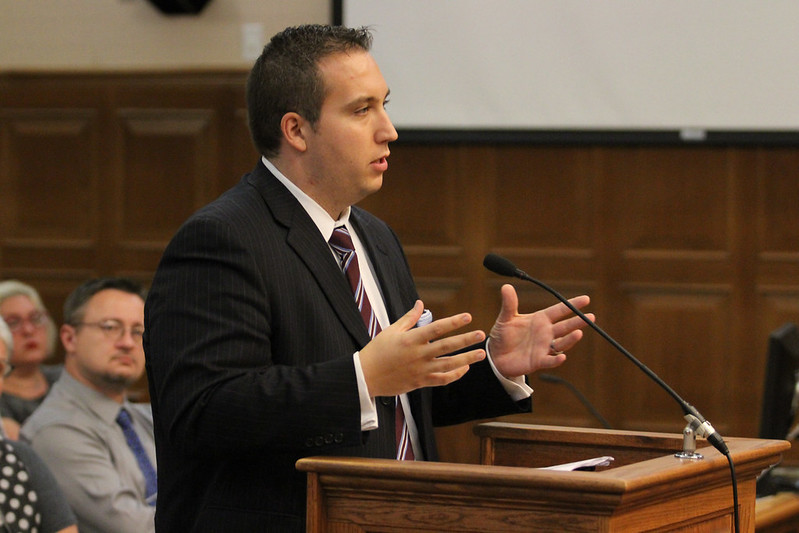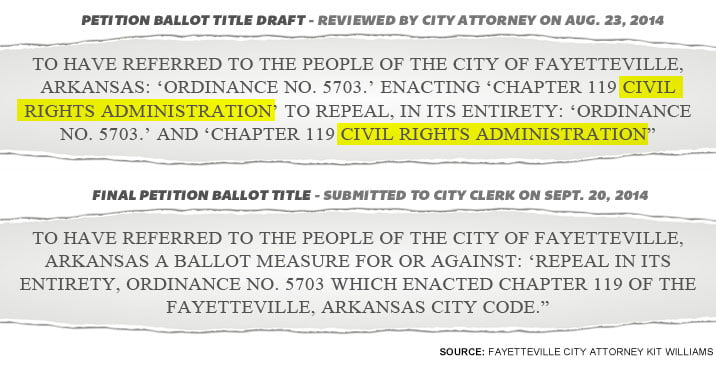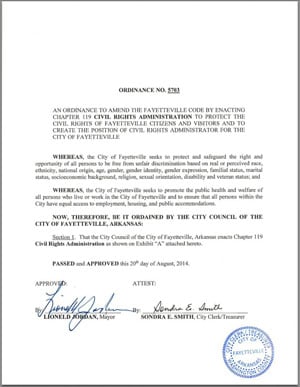
Travis Story, general counsel for Repeal 119, explains that petitioners want a “For” vote to be a vote against the Civil Rights Administrator ordinance.
Photo: Todd Gill, Flyer staff
Fayetteville aldermen on Tuesday agreed on what a “For” vote should mean when residents cast ballots in the upcoming special election to uphold or repeal a contentious new anti-discrimination ordinance.
The Civil Rights Administration ordinance, if it’s upheld, would prohibit business owners and landlords from unjustly firing or evicting someone because of their sexual orientation, gender identity and other characteristics. It would also create a civil rights administrator position to receive, investigate, and sometimes mediate complaints from residents who feel they are victims of discrimination.
The ordinance was approved in late August, but petitioners with a group called Repeal 119 turned in enough signatures to put the law on hold and force a special election to decide the fate of the new law.
As part of the referendum process, aldermen must approve the title of the ballot question and set a date for the election.
What does a “For” vote mean?
Petitioners want a “For” vote to be used to repeal the ordinance, but Fayetteville City Attorney Kit Williams said that could be confusing to voters and may violate state law.
Williams said it is more straightforward and understandable for a “For” vote to actually be a vote for the ordinance and an “Against” vote to be a vote against the ordinance.
Williams said attorneys representing Repeal 119 asked him to review the language of their petition three days after the ordinance was approved. They also questioned whether the ballot title should even appear on the petition itself.
“Do either of you know if the ballot title and popular name is required for a municipal referendum?” asked Stephanie Nichols, a Jonesboro-area lawyer who said she helped draft the petition, in an Aug. 23 email to Williams and City Clerk Sondra Smith. “We have not been able to get a definitive answer on that.”
While the state does spell out specific rules for referendums on county ordinances, Williams admitted that municipalities do not have their own state statute to clearly explain how petitions and ballots should read.
Arkansas law, however, does state that ballots should be designed to ensure voters are not misled at the polls, said Williams.
“The statutory requirement that a “For” vote must be for the measure and cannot be against its enactment is made very clear,” he said.
Name and number
Williams said petitioners also left out the name of the ordinance in the ballot title section of their petition. He said the name was included in the draft he reviewed on Aug. 23, but that it was removed before petitioners began collecting signatures.

The words “civil rights administration” did not appear in the ballot title of the 802 petitions submitted to City Clerk Smith’s office on Sept. 20.
That doesn’t necessarily invalidate the petitions, said Williams, because those words did appear near the top of the petition. But because they were excluded from the actual ballot title, Williams said he could not recommend forwarding the petitioners’ version to the Washington County Election Commission.
A ballot title that describes an ordinance only by its number, Williams said, is not in line with decisions made by the Supreme Court.
Quoting from Walmsley v. Martin, Williams said the courts have explained that “the purpose of a ballot title is to allow a voter to reach an intelligent and informed decision for or against the proposal and to understand the consequences of his or her vote.”
Agree to disagree?
Travis Story, general counsel for Repeal 119, said he doesn’t believe it’s up to Williams – or the City Council – to decide what the ballot title should be.
“We simply feel that the language that’s on the petition should be included on the ballot,” said Story. “Anything else that would be added or subtracted from the petition language, we don’t believe would be found as a jurisdictional matter for this council.”
Williams said it’s not a matter of whether the City Council “can” change the wording on the ballot, but that they “must” revise the ballot title in order to have a valid election.
“You cannot ignore the Supreme Court’s ruling that a title has a very important part which is to inform the voters,” said Williams. “If you only refer to numbers and don’t even use the name of the ordinance, then how can someone walking in and looking at the ballot know what they’re voting for?”
Story said he had submitted his own version of a ballot title to the county clerk on Tuesday in hopes that the election commission would side with the petitioners.
“What we’re trying to do is something short of throwing this into litigation,” said Story. “Nobody wants that.”
Williams said with no specific system in place for designing municipal referendum elections, it might be best left to the county – or even a judge – to interpret which ballot title best reflects the intention of state law.
“Maybe we can bring a little light into these referendum elections for municipal ordinances,” said Williams.
Story said he’d also like to see the issued cleared up.
“I agree with Mr. Williams that the law on this is very, very murky,” said Story. “At this point we’ve agreed to disagree.”
Public comment
Five residents who spoke Tuesday sided with Williams.
“Why would you not want your voters to be informed?” asked Laura Hampton, a disabled resident who was appointed by Mayor Lioneld Jordan to participate in a panel discussion for implementing the ordinance in September. “I think it’s very important to include that language on the ballot so the people voting know exactly what they are voting for.”
Anne Shelley, spokeswoman for the group Keep Fayetteville Fair, agreed with Hampton.
“This particular issue…will put the rights of a minority in front of the vote of the majority,” said Shelley. “For that reason alone it’s absolutely necessary that we have full transparency.”
Shelley, who is director of the Northwest Arkansas Rape Crisis Center, said it’s important that people know the difference between yes and no.
“What kind of message do we send our community as a whole if we say “For” means against and “Against” means for?” she asked. “Let’s not send that message to our children and let’s not send that message to the voters.”
City Council members weigh in
Aldermen Mark Kinion, Alan Long, Sarah Marsh, Matthew Petty and Justin Tennant all spoke in favor of William’s recommended ballot title.
Tennant, who voted against the ordinance in August, said while it was a difficult question, he couldn’t support a ballot title that might violate state law.
“Even knowing there might be litigation,” said Tennant, “I have a tough time going against what has been said by the Supreme Court.”
Long said his decision was more about making sure there is no confusion at the polls.
“For my constituents, I have to look at this and ask myself what would be easiest for them to understand when looking at the ballot,” said Long. “I think our city attorney has drafted the most clear version.”
In the end, the City Council voted unanimously to approve William’s suggested language that states a “For” vote is a vote in favor of the ordinance and an “Against” vote is a vote against it.
Aldermen also approved a Dec. 9 date for the special election, but included an amendment to allow the county to move the election to Jan. 13 if litigation delays the ballot title submission.
Chapter 119, Civil Rights Ordinance
Fayetteville City Council members passed a controversial anti-discrimination ordinance at around 3:45 a.m. Wednesday, Aug. 20 after nearly 10 hours of public discussion and debate inside City Hall.
The ordinance prohibits business owners and landlords from unjustly firing or evicting someone because of their sexual orientation, gender identity, socioeconomic background, marital status or veteran status. It also creates a civil rights administrator position to receive and investigate complaints from residents who feel they are victims of those specific types of discrimination. Offenders could be fined up to $500 if it is determined they violated the ordinance.
The ordinance was approved 6-2 with council members Adella Gray, Sarah Marsh, Mark Kinion, Matthew Petty, Rhonda Adams and Alan Long voting in favor of the measure. Ward 3 aldermen Justin Tennant and Martin Schoppmeyer voted against the ordinance.
A group called Repeal 119 immediately began a petitioning campaign to stop the implementation of the ordinance, and eventually turned in enough signatures to put the new law on hold and force a Dec. 9 special election to decide the fate of the ordinance.


